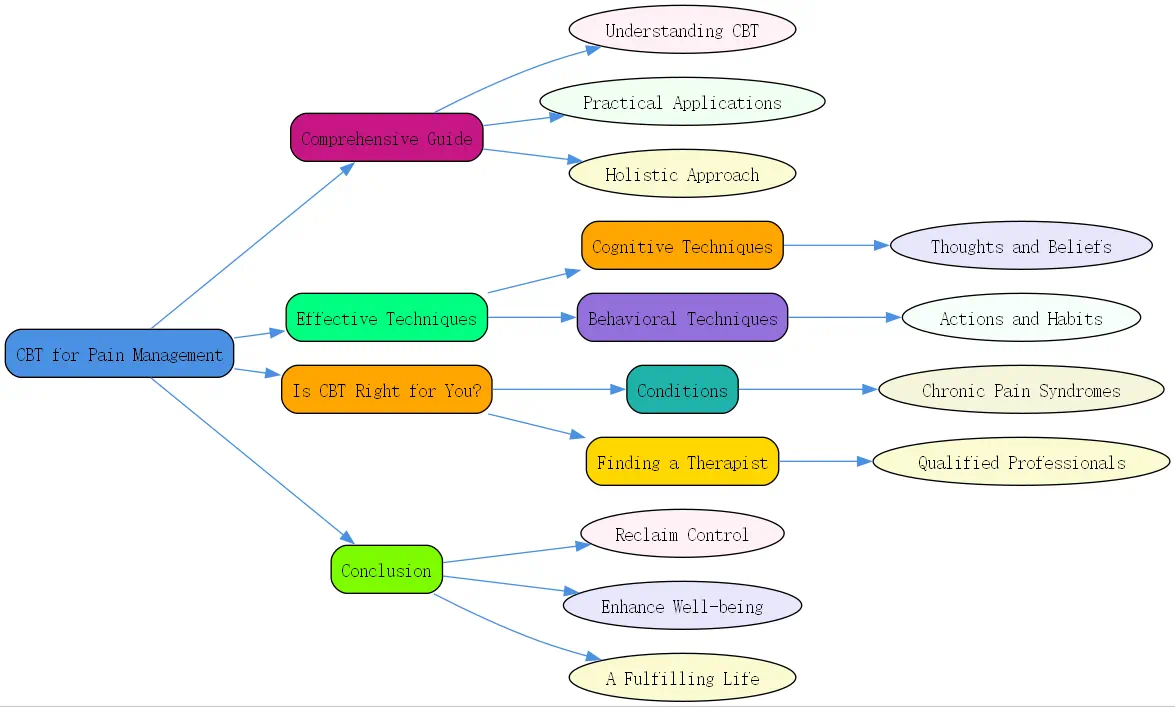Unlock the potential of CBT for pain management with our comprehensive guide. Explore effective techniques, benefits, and actionable insights for chronic pain relief.

CBT for Pain Management: A Comprehensive Guide

Understanding CBT for Pain Management
Cognitive Behavioral Therapy (CBT) is a form of psychotherapy that addresses the way thoughts and feelings influence behaviors. Unlike traditional pain management approaches that may rely heavily on medication, CBT tackles pain by changing the patient’s attitude towards their experience and teaching them coping skills.
The science behind CBT’s effectiveness for chronic pain is robust. Studies have shown that CBT can alter the way the brain processes pain, thus reducing pain intensity and improving quality of life. This transformative approach not only addresses the physical aspects of pain but also the psychological factors, making it a comprehensive method for pain management.

CBT Techniques for Pain Management: Practical Applications
CBT offers a variety of strategies to manage pain effectively:
- Cognitive Restructuring: This involves identifying and challenging negative thought patterns related to pain, reshaping them into more positive and realistic thoughts.

- Behavioral Activation: By focusing on increasing engagement in enjoyable activities, CBT helps distract from the pain and reinforces positive emotions.
- Relaxation Techniques: Techniques such as deep breathing, progressive muscle relaxation, and mindfulness can significantly help reduce tension and alleviate pain.
- Pain Education: Understanding the biological, psychological, and social contributors to pain can empower patients to manage their conditions better.
- Problem-Solving Skills: Patients learn to strategize and cope with pain-related challenges, enhancing their ability to manage pain in daily life.
CBT also includes developing personal skills through practical applications like completing worksheets for anxiety management, which further aids in handling stress and anxiety linked with chronic pain.
Benefits of CBT and Pain Management: A Holistic Approach
The holistic benefits of CBT in pain management are substantial:
- Reduces Pain Intensity: CBT helps patients manage their pain better, which can lead to less perceived pain.
- Decreased Reliance on Medication: By providing coping mechanisms, CBT can reduce the need for pharmaceutical interventions.
- Enhanced Coping Skills: Patients learn how to deal with pain effectively, improving their emotional well-being.
- Improved Quality of Life: With better pain management, patients often experience an overall improvement in life satisfaction.
Effective CBT Techniques for Pain Management
Cognitive Techniques
- Identifying and Challenging Negative Thoughts: Recognize and transform negativity that exacerbates pain sensations.
- Thought Records: Keeping a journal to note triggers and successes can also be insightful.
- Positive Self-Talk and Affirmations: Encourages a healthier mindset that combats the psychological facets of pain.
Behavioral Techniques
- Activity Pacing: Helps in balancing rest with activity to avoid exacerbating pain.
- Goal Setting: Focuses on small, manageable milestones that lead to bigger successes.
- Mindfulness Meditation: Aids in focusing on the present, reducing the stress that can increase pain perception.
Is CBT Pain Management Right for You?
Conditions that Benefit from CBT
Chronic conditions like back pain, fibromyalgia, and arthritis have been shown to improve with CBT, due to its comprehensive approach in managing the psychological aspects linked with these conditions.
Finding a Qualified CBT Therapist
When seeking a CBT therapist, it’s crucial to ask about their experience with pain management. Exploring online resources and programs that focus on CBT can also be beneficial. BrainTalking offers a range of resources and guidance on navigating these options effectively.
Conclusion
CBT’s versatile and holistic approach makes it a compelling option for those struggling with chronic pain. Whether through one-on-one therapy sessions or supportive resources like worksheets for anxiety management, CBT empowers individuals to reclaim control over their life, reducing pain, and enhancing overall well-being. Choosing to explore CBT could be the first step towards a more active, fulfilling life despite chronic pain.




